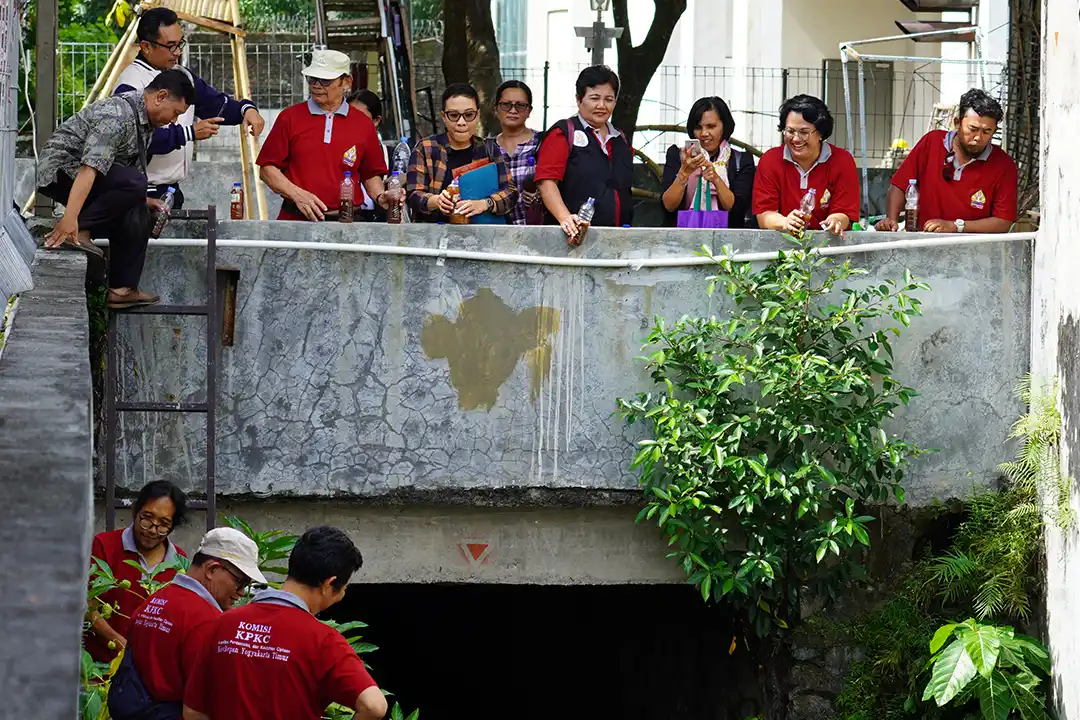Faith-based and environmental advocates in Yogyakarta, Indonesia are spearheading a grassroots campaign to confront the city’s worsening waste and water pollution crisis, calling on local communities to take an active role in environmental stewardship.
Amid growing concern over overflowing landfills and contaminated waterways, the Commission for Justice, Peace, and Integrity of Creation (KPKC) of the Eastern Yogyakarta Vicariate in the Archdiocese of Semarang, partnered with the Laudato Si’ Movement Indonesia – Yogyakarta Chapter to organize a public seminar aimed at fostering community-led waste management.
Held at Atma Jaya University Yogyakarta (UAJY), the event gathered more than 100 participants, including environmentalists, academics, and residents.
In his opening remarks, KPKC Chair Agustinus Sumaryoto urged participants to go beyond dialogue and take concrete steps in their own neighborhoods.
“We don’t want this seminar to be just a forum for discussion, but a catalyst for real action at the community level,” he said. “Every individual has a role to play in managing waste wisely.”
Yogyakarta produces an estimated 1,300 tons of waste daily, according to the Regional Office of Environment and Forestry (DLHK DIY). Roughly 60 percent is organic waste—much of it unmanaged, the archdiocese reported.
The recent closure of the Piyungan Final Disposal Site due to overcapacity has further aggravated the problem. Compounding the crisis, untreated domestic waste continues to pollute the region’s rivers, threatening access to clean water.
Addressing participants, Agustinus Irawan, S.T., emphasized the importance of household waste segregation as a critical solution.
“If every household separates organic and inorganic waste, the burden on landfills will be significantly reduced,” he said. “Organic waste can be composted, while inorganic waste can be recycled or repurposed.”
The seminar also spotlighted sustainable water practices. In a session focused on water security, Frederico Dwi Setyanto, S.Sn., introduced rainwater harvesting as a household-level solution.
“This is a simple technique that households can adopt to reduce reliance on groundwater,” he said.
Drs. P. Kianto Atmodjo, M.Si., shared community-based approaches to turning organic waste into income-generating products, noting that environmental action can also support local livelihoods.
“With proper processing, organic waste can become compost or livestock feed,” he said. “This not only reduces waste but also offers economic benefits.”
The seminar culminated with participants pledging to establish community working groups in their respective areas. These groups will lead localized initiatives such as waste banks, environmental education drives, and recycling efforts.
Fransisca Supriyani Wulandari, S.Pd., who led a hands-on session on recycling practices, underscored the power of small, daily actions.
“Big changes always start with small steps. Sorting waste is a real contribution we can make every day,” she said.
Participants also took part in a symbolic act of pouring eco-enzyme into a local river—a gesture aimed at raising awareness about water pollution and communal responsibility.
“We are optimistic this movement will have a positive impact on the environment,” said Sumaryoto in closing. “With strong collaboration, we can protect the earth and water for future generations.”
Inspired by the principles of Laudato Si’, Pope Francis’ encyclical on ecological justice, organizers hope the initiative will serve as a model for participatory environmental action across the region.
“With collective commitment, a cleaner and more sustainable future is not just a dream—but a reality within reach.”







